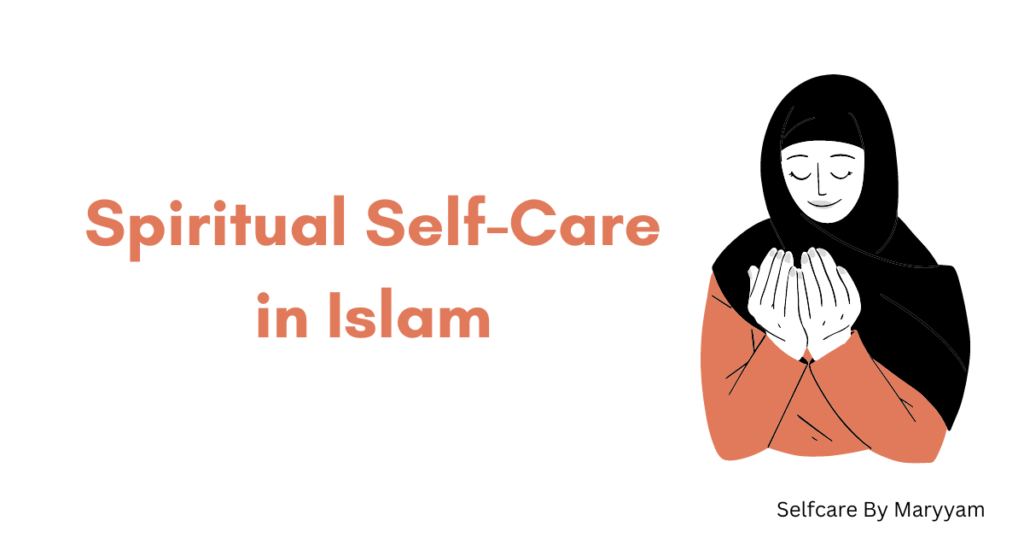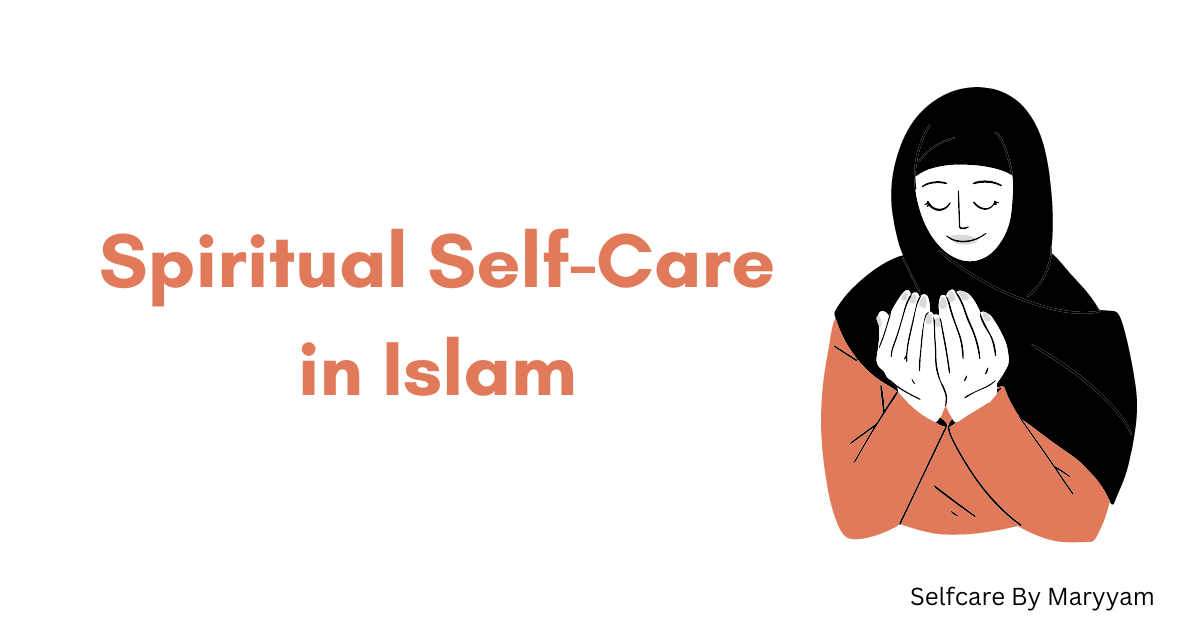Table of Contents
Introduction: Spiritual Self-Care in Islam
Spiritual self-care in Islam has its own importance. It indicates the connection of a person with Allah. It means that you are improving your connection with Allah. According to Islam, all humans are unique and important to God. For many young Muslims, this belief may be highly beneficial when it comes to practicing self-care—mental, physical, and spiritual.

Setting the Stage: Defining Spiritual Self-Care
Spiritual self-care is something that helps you understand your inner self deeply. It also helps you to make your beliefs strong in Allah and guide yourself towards spirituality.
Understanding the Islamic Perspective
Most of us are not familiar with spiritual self-care from an Islamic perspective. If we understand it and follow it, then we can change our whole lives. We are living a meaningless life if we are not working on our spiritual self-care.
The Core Tenets of Islam and Spiritual Self-Care in Islam
First of all, in Islam, it is a condition to believe in the oneness of Allah. We can only understand the real meaning of spirituality if we put our faith in Allah. There is no one but Allah who is handling our whole situation. He knows through whom we are suffering and what we need in life.
The first step to spiritual self-care is to surrender yourself to Allah, knowing that what will happen in my life is by the will of Allah. When you start taking small steps towards Allah, He will make things easy for you. Then you will begin to feel peace in your life. Even if you have any problems, your belief is in Allah, and you will still be at peace with Him.
The Concept of Tazkiyah: Purification of the Soul
Here, I’m relating Tazkiyah to the purification of the soul. Most of us are not familiar with the word tazkiyah. Tazkiyah means replacing your bad habits with good ones. It includes self-cleansing and killing your ego.
The purpose of the Tazkiyah is to purify your heart from the darkness of sins and remove the unhealthy attachments from your life to the healthier ones. Indeed, healthier attachments are the ones that connect you to Allah.
Connection with Allah: Importance and Benefits
Connecting yourself with Allah is a necessary part of our lives. If you have all the things in life but there is no connection between you and Allah, then you are living an unhealthy life. On the other hand, if you are facing problems in life but you are connected to Allah, then these problems will become a blessing for you.
There are a lot of benefits to a connection with Allah. Allah loves us, and He loves to be with us. He is exactly with us in the way we think about HIM. Whatever we expect from Him, we get from Him. Now it’s up to us: what are we asking about?
Inner Peace and Tranquility: The Rewards of Spiritual Self-Care in Islam
If we talk about the rewards of spiritual self-care, then the inner piece is one of them. If anyone has an inner piece, then that person is the blessed one. Most of the people are moving from here and there just for the sake of inner peace. Most teenagers are facing this problem. The only solution is to surrender yourself to Allah.
Strengthening Faith: How Spiritual Self-Care in Islam Deepens Belief
Spiritual self-care also deepens your belief. When you think about Allah and think about how beautifully Allah handles all things, this will help you develop faith in Allah. In today’s world, we are so busy that we even can’t find time to sit calmly and observe nature.
You can decide a time that you will spend 5 minutes observing Allah’s creation. Gradually, you can increase this time limit. By doing this, you will feel a positive change in yourself.
Practical Applications: Implementing Spiritual Self-Care in Daily Life
Implementing spiritual self-care can be helpful for the rest of your life. You can improve your life cycle and become successful by practicing new spiritual practices. For example:
- You can start your day by being grateful to Allah for a new day.
- You can pray on time. Salah is the cornerstone of the spiritual connection.
- You can read a page of the Quran daily with its translation. Reading the Quran helps nourish the soul with Allah’s guidance.
- You can do Allah’s dhikr. This will establish a deep bond between you and Allah, as when you remember Allah, He will remember you as well.
- You can send Darood to Hazrat Muhammad ﷺ. We can vanquish our bad deeds and tensions by sending Daroodton our beloved Hazrat Muhammad ﷺ.
- You can do acts of kindness and charity.
- You can forgive the people who hurt you.
These habits will become your strength one day, In Sha Allah. Keep this in mind; take every step for the sake of the happiness of Allah. If you do anything to make people happy, but not Allah, that thing will not benefit you, even if it is a good deed.
Nurturing Relationships: The Role of Community in Spiritual Self-Care in Islam
Maintaining healthy relationships within the Muslim community is extremely important to our spiritual well-being. We get support and encouragement from other believers when we connect with them. Our faith gets stronger, and we feel like we belong when we are a part of a community. We can be happy and united when we pray together, study Islam, and share important occasions.
In addition, our community supports us in times of need. Inclusion and warmth toward all members of our community foster the development of long-lasting relationships. In short, being surrounded by a community fosters spiritual development and a sense of closerness to Allah.
Conclusion: Spiritual Self-Care in Islam
All in all, the significance of otherworldly taking care of oneself in Islam couldn’t possibly be more significant. It fills in as an essential pathway to extending our association with Allah and supporting our spirits. Through understanding and rehearsing otherworldly ways of taking care of oneself, we set out on an excursion of inward change and satisfaction. By giving ourselves over to Allah’s will and filtering our hearts through Tazkiyah, we discover a lasting sense of harmony and serenity in the midst of life’s difficulties.
Reinforcing our confidence through petition, reflection, and thoughtful gestures advances our lives and carries us closer to Allah. Carrying out commonsense utilizations of otherworldly taking care of oneself in our day-to-day routines engages us to have deliberate and significant existences directed by Islamic standards.
Besides, sustaining connections inside the Muslim people group assumes an urgent part in our profound prosperity, offering help, consolation, and a feeling of having a place. As we endeavor to develop profound self-care in our lives, let us recall that our definitive objective is to look for Allah’s pleasure and move nearer to Him, for in those true genuine satisfaction and fulfillment.
FAQs for Spiritual Self-Care in Islam
1. What is spiritual self-care in Islam?
In Islam, spiritual self-care has its own importance. It indicates the connection of a person with Allah. It means that you are improving your connection with Allah.
2. Why is spiritual self-care important in Islam?
Spiritual self-care is essential in Islam because it helps believers strengthen their faith, find inner peace, and align their lives with Islamic principles. It serves as a means of seeking closeness to Allah and attaining spiritual fulfillment.
3. How does spiritual self-care differ from other forms of self-care?
While conventional self-care focuses on physical and mental well-being, spiritual self-care in Islam encompasses nurturing the soul and fostering a deeper connection with Allah. It involves practices such as prayer, Quranic recitation, and acts of kindness rooted in Islamic teachings
4. What are some practical ways to practice spiritual self-care in daily life?
Practical applications of spiritual self-care include performing daily prayers (Salah), reciting the Quran with reflection, engaging in Dhikr (remembrance of Allah), and participating in acts of charity and kindness. These practices help individuals cultivate a sense of spirituality and mindfulness in their everyday lives.
5. How does spiritual self-care contribute to personal growth and well-being?
Engaging in spiritual self-care enables individuals to develop resilience, inner peace, and a sense of purpose. By strengthening their faith and connection with Allah, believers experience emotional and psychological benefits, including reduced stress, increased gratitude, and enhanced overall well-being.
6. What role does community play in spiritual self-care?
Community support and engagement are integral to spiritual self-care in Islam. Believers find encouragement, solidarity, and companionship within the Muslim community, which fosters spiritual growth and provides a sense of belonging. Through communal worship, study circles, and acts of kindness, individuals strengthen their faith and bond with fellow believers.
7. How can I overcome obstacles to practicing spiritual self-care?
Overcoming obstacles to spiritual self-care requires commitment, patience, and perseverance. By prioritizing spiritual practices, seeking knowledge, and seeking support from the community, individuals can overcome challenges such as lack of time, distractions, and doubts and cultivate a deeper connection with Allah.


1 thought on “2. The Importance of Effective Spiritual Self-Care in Islam”